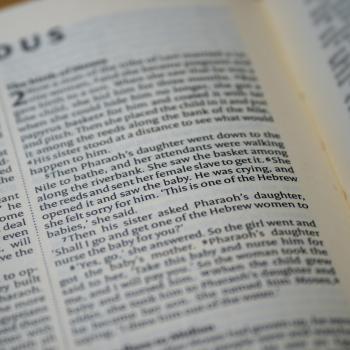At the onset of this piece, I wish to convey that I genuinely believe Andy Stanley to be a brother in Christ. I also believe he has a sincere desire to shepherd people, but unfortunately his desire to do so has led down many problematic paths in his teaching ministry. I wrote before regarding his statements on the virgin birth, much to the chagrin of many who count Andy Stanley as pastor emeritus due to his large following.
I debated on writing this piece, mainly because I am exhausted from a semester of Hebrew and have taken the last month as a writing hiatus. However, there are some things I find a particularly difficult time overlooking. Andy Stanley’s recent sermon calling Christians to “unhitch” their faith from the Old Testament is one of them.
Now, Andy Stanley has made his fair share of statements worthy of critique. I wish to give him the benefit of the doubt in some instances, but often I find he makes more problematic statements than those that are actually helpful to people. I’m going to spend some time pulling apart some of the more problematic statements in his sermon – so if you haven’t listened to it, do so. It will give context that I’m not going to spend a tremendous amount of time building here.
Primarily, the main issue I keep coming to with Andy’s sermons is his downplay of Scripture’s authority with those struggling to understand and adhere to it. He sets the bar incredibly low, and he has for some time – mainly bound by his continual need to pander to these same people. His focus is drawn toward making it easy for those who doubt Christianity’s premises, yet it is always to the detriment of the Scriptures.
He’s not wrong in correlating the foundation of the early church upon the life, death, and resurrection of Christ – yet he shows an astounding level of ignorance on the importance of the Scriptures in this to modern believers. Secondly, this same ignorance is then applied to the Scripture’s authority over the believer, especially as one considers the distinction of the Law and gospel and how they relate to modern Christians.
Now, this discussion of continuity and discontinuity is a valid discussion, which holds no small point of disagreement amongst Christians. Andy Stanley uses the practice of circumcision to build upon this, indicating that due to the Council of Jerusalem, it was no longer a requirement. And here’s where it gets incredibly dicey; Andy suggests that we use a direct application to today with the authority and pertinence of the Old Testament Scriptures. As a quick aside, it must be stated that for modern Christians, the reason we even know about the life, death, and resurrection of Christ is because we have an accurate compendium of God-given revelation.
Andy Stanley is sure to give a head nod here, yet he is keen on relegating the Scriptures to the sidelines whenever people show a hint of difficulty reconciling their content with holding to the key tenets of the faith. In reality, what he is actually doing is playing to the sentiments of the common, but faulty notion that the God of the Old Testament acts in a completely different manner than the God of the NT. In this, he neglects to adequately paint what the Old Testament teaches about the character of God and the person of Christ, yet he also gives a faulty premise in correlating the lack of faith to a faulty relationship with the Old Testament.
If you listen to the sermon, his main point is this idea:
“Peter, James, and Paul elected to unhitch the Christian faith from the Jewish Scriptures. And we must as well…we must not make it difficult for those Gentiles who are turning to God. They didn’t. We shouldn’t either. The faith of the next generation may depend on our ability to get this right. The faith of your neighbor may depend on it. And who knows? Someday your faith may depend on it as well.”
In other words, making it a standard to accept all of the Scripture’s historicity, reliability, applicability, etc., is making it more difficult to win converts to Christ, because Christ is all that matters. You can hold on to your faith and deny these things – and what’s more than this is that it will have no bearing on your faith. The Jewish Scriptures had a particular context and demographic in mind, yet they don’t apply to the believer today because, “…Christianity [is] not Judiasm 2.0. It [is] not an add-on. It was a stand-alone, say goodbye to the past, new. Jesus was not an and. Jesus was an instead of.” And again, “Your whole house of Old Testament cards could come tumbling down… the question is if Jesus rose from the dead.”
In a nutshell, Andy Stanley sets the bar as low as possible for people to become and remain Christian. This is nothing surprising or novel in his teaching. He’s done this numerous times in the past and it is likely that he will continue to do so in the future. The problem here is that Andy Stanley simply speaks to this issue out of his own authority – yet the authority of the pastor is only found within his faithfulness to the Scriptures. If a pastor steps outside of the bounds of Scripture, he has no authority. It truthfully is as simple as that.
As to the issues relegated to what he says, it is built upon an incredibly faulty understanding of the Old Testament.
- The only Scriptures that the early church had available to them was the Old Testament. The Bereans were considered nobler than their constituents because they verified Paul’s teaching from the Jewish Scriptures, not because they jettisoned them to the side in favor of hearing about the life, death, and resurrection of Christ. They verified his teachings in light of what was already revealed by God, and found them to be in harmony with His salvific plan.
- This means for us that the Old Testament must teach an incredibly large amount about Christ. If one can read them and verify the teaching of the apostles, it is incredibly problematic to suggest to people they ought to unhitch themselves from the Old Testament.
- His main premise for this is due to people having difficulties reconciling with modern critical beliefs (say the historicity of Adam and Eve for example) with their current faith. In this, his suggestion is essentially that one ought to simply not worry about it and hold to the resurrection. Well, that’s all good and fine – but that doesn’t really hold up to scrutiny. It is a stark inconsistency to speak of the inherited guilt of sin and the grand, meta-narrative of the Messiah to reconcile us to our Creator, if it is only a theoretical imputation of sin through Adam. That’s just one, short example.
- He also mentions that the New Testament authors unhitched themselves from their Jewish writings for the sake of new converts. No. This simply is not true. All of the New Testament authors continually quote the Old Testament to shed light on what happens through God’s administration of the New Covenant. Paul, the one Andy Stanley highlights as the poster-boy example for this, literally oozes Old Testament references in almost every single sentence he writes, especially when he references sexual purity (a point Andy says contrary to). Any Jew and learned Greek (such as Luke, who also drips with reference to the OT all throughout his two works; see Acts 2) would have clearly seen these references. Why? Because they knew their Old Testament.
- Andy maintains that the decisions made at the Council of Jerusalem have nothing to do with keeping Mosaic Law, but instead, the keeping of the peace between Gentiles and Jews. He further illustrates these changes are bound with the teaching of Paul, centralizing upon the death and resurrection of Christ. Andy’s not entirely wrong here (Paul, of course, centralizes upon Christ) – but as in the previous point, he still binds these teachings with reference to the Mosaic Law. Secondly, these decisions at the Council of Jerusalem were not about keeping the peace as Andy Stanley maintains, but in reality, demonstrating the fulfillment of what Christ had accomplished in his death and resurrection. It is an inclusion of the Gentiles into the covenant and a fulfillment of that covenant – not an “unhitching”.
- The entirety of this premise is built around the idea that God was not gracious in giving the Mosaic Law to His people. It was an unruly burden rather than a gracious implementation of God’s own standard in order to facilitate the Jewish people’s relation to Him. Yet just as we look to the administration of the New Covenant, we must look at the Old. God clearly revealed Himself to a people in the midst of a world immersed in paganism – a world that simply had no clarity with regard to how they related to deity. There are Ugaritic texts found on pottery that give a clearer picture to this, but essentially, they were continually left wondering if the gods were angry with them, even when they performed a ritual, namely because there was no clear standard. This was obviously not so with the Jewish people.
- He wishes to relegate the Old Testament to the Jewish people, claiming the apostles all did this as well. However, why not be consistent in this hermeneutic if we are to employ it? Why not point out that Luke wrote to Theophilus in both Luke and Acts – and that we ought to simply unhitch ourselves from the points Luke makes painfully clear regarding the miraculous nature of the resurrection itself? The point is not to actually suggest such a painfully naïve way of reading the Scripture, but to simply point out the logical inconsistency.
So why draw all of this out? What’s really the big deal? Andy Stanley is not a person who rightly divides the Word and he has proven himself to not be on a trajectory toward improvement. He continually undermines the importance of the Scriptures – even though he is quick to play lip-service to this. He sets the bar as low as possible for new converts, yet the bar never gets raised for those who, in spite of much of his teaching, become actual converts. More clearly, he doesn’t even wish to give babes in the faith milk, but a watered-down variant of milk that is lacking in sustenance.
I am fearful for the man in the simple notion that he is deceived into thinking he is doing good in continually downplaying a seriousness with which we ought to take the Scriptures. He teaches in this capacity and encourages multitudes to unhitch themselves from the oracles of God in order to maintain their faith. When you apply that logic consistently on any controversial teaching on Christ, which is all foretold in the Old Testament, you will inevitably come to deny things like the Virgin birth (something he also has no issue with). You can’t be a Christian and unhitch yourself from the things he would suggest you can – namely because Christ Himself clearly taught that the Law of Moses, the Prophets, and the Psalms all testified to Him (Luke 24:44)!
What was written? He goes on to say in Luke 24:46-48, “This is what is written: The Christ will suffer and rise from the dead on the third day, and in His name repentance and forgiveness of sins will be proclaimed to all nations, beginning in Jerusalem. You are witnesses of these things” (emphasis mine). The life, death, and resurrection is all there, and Christ indicates the apostles as those who are witnessing these things firsthand. What did they write about, but those things which they witnessed?
Andy, please choose your words carefully. You’re on a dangerous trajectory and Scripture clearly sheds abundant light on this situation. You can’t unhitch the faith from the Old Testament. Jesus was not an and, nor was he an instead of. He’s an always has been.












